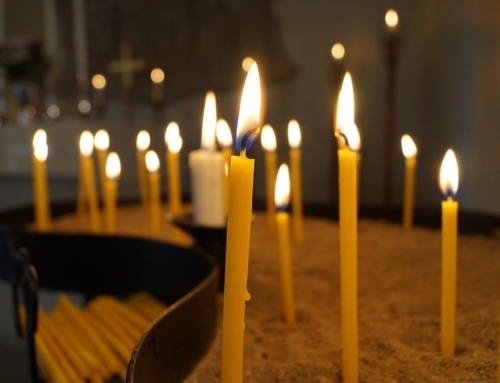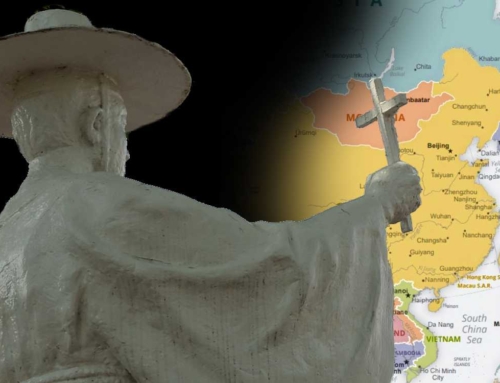The life story of the German Franciscan priest, Fr. Gereon Goldmann, is one for the ages. Some of his tales of miraculous escapes from certain death, victory in the face of overwhelming odds, and the power of faith and prayer are so extraordinary that one must see them in the perspective of a whole life to believe that they actually happened.
In the year 2000, Ignatius Press published Fr. Goldmann’s autobiography, The Shadow of His Wings, and it is a must-read for anyone experiencing suffering or misfortune. One comes away from the book with a profound sense of God’s Providence watching over His beloved children, particularly over priests and religious, whose missions of service to souls has a special blessing.
Father Goldmann (1916-2003)
It would be impossible to recount the many details of Father’s 300-page autobiography here and do justice to them, but certain elements of his life’s story form the background to the extraordinary account of the nun and the Nazi that follows.
Father grew up in a devout Catholic family of seven boys and lost his mother when he was seven. Despite that, he had a happy childhood and entered the Franciscan community when he was 17. At age 22 he and 200 other seminarians were drafted into Hitler’s army.
Despite much harassment, ridicule and persecution, Goldmann always defended the Catholic Church and its teaching. At one point, however, he and ten other seminarians were ordered to renounce their Catholic faith and sign a pledge that they would never set foot in a Catholic church again.
All but one of the young men adamantly refused, fully understanding that their refusal could lead to court martial. Instead, he and the others were immediately sent to the dreaded Russian Front where almost certain death awaited them. Goldmann survived that experience, which was one of several harrowing near death experiences he recounts in the book.
Incredibly, while he was still serving in Hitler’s army in Italy during the Second World War, he received a personal dispensation from Pope Pius XII authorizing his ordination to the Catholic priesthood even though he had not completed his studies for Holy Orders!
Father remained as an army chaplain for the duration of the war and afterwards was sent to North Africa to serve in the desolate German POW camps there. His service in a French-run camp in Morocco is the setting for the following story.
Sister Jeanne of the desert
While there, Fr. Goldmann met a fierce French nun named Sister Jeanne in the desert outside the city of Khenifra. What follows is a tale of extraordinary sacrifice and generosity as told in his autobiography (reprinted with permission):
On one of my trips… I learned that in the valley of these mountains, known as the “Valley of Hell” because of its intense heat, a Sister was living all alone. I could not believe it at first, it was so unprecedented. When I had a chance to go there later on, I found Sister Jeanne living isolated from all Europeans in the beautiful mountain district of Khenifra, in solitude and penance. Having obtained special permission from the pope, she had sought out this lonely spot, where she fasted with almost inhuman rigor. The three days I was there I suffered continuously from hunger – I who thought I knew a great deal about privation! She cared for the native sick in the villages, going from early morning until late at night into the dirty huts to nurse their frightful wounds and festering sores. Then every night she knelt as motionless as a statue of stone before the Blessed Sacrament for three hours – I saw this with my own unbelieving eyes…. What I heard and saw there was unbelievable. Her bed was a board; her meal, thin soup; but she was happy as a child and physically much stronger and enduring than I.
The first time I came into her solitude — it was soon after I became chaplain in the Nazi camp – was at a time when I had lost all courage to go on because of the extreme opposition and persecution I suffered, while making no progress that I could see. When I told her that I was thinking of going to another camp where the work would be easier and more satisfying, she told me almost fiercely that I was to return to the Nazi camp.
“Sister Jeanne, I cannot. It is just too much for me. I have done everything I can, and still I have failed to bring that camp to Christ.”
She amazed me by seizing my habit and looking me in the eyes, saying in a voice that pierced bone and marrow, “Father, in God’s name, you are going back to your camp at once!”
I recovered from my surprise at being so “commanded”, since her order was given in such a way that I knew I dare not oppose her. At the same time, she made me write down the name of the worst enemy of the Church on a piece of paper. “Leave all the rest to me, Father,” she said.
I did as she asked, giving her the name of Kroch, a fanatical Nazi, a terrible persecutor of the Church and her French people, and returned to camp. I really did not have too much time to think about Sister Jeanne after that, and when Kroch came to speak to me three months later, I was preoccupied. I was so angry at his continuous vituperation against me and his ugly remarks against God and Church that I would not see him.…
The next morning as I stood in line for the small bread ration, he actually came up to me and asked, without trying to conceal his request from the others standing by us, if he could go to confession.
“I was a Catholic, Father. Once I was even a mass server; my mother was a pious woman, who would be so happy if she could know that I had come back to the Church.” I could hardly believe my ears, but it was really so. I knew something of his history; for many years, even before the war, he had been a leader of the youth against God and had played a leading role in Nazi Germany.
However touched, however moved I was by this request, his admittance back into the Church could not be a simple matter. He must do public penance for his many public wrongs. Every Sunday for months he had to stand before the altar, a poor penitent, an admitted sinner. Finally came the Sunday when he acknowledged publicly before many hundreds of men, who listen breathlessly to what he had to say, his guilt and his whole shameful history – from a pious lad to one of the most vicious haters of the Church. He recounted the story of his return to the Church and asked for pardon. Then at last he received sacramental absolution and Holy Communion. The men stood around the altar with tears in their eyes, and later many of them stood waiting patiently before the confessional to end their lives of sin.

Soul Work
The saints (canonized and un-canonized) remind us that the salvation of many lost souls may not take place without much prayer and sacrifice. Padre Pio once said, “Souls are not given as a gift; they are bought. Don’t you know what they cost Jesus? They must be paid for with the same coin.”
Those are the words of a saint who knew the cost of sin and the price of redemption. The incredible generosity of Sr. Jeanne in the desert is almost frightening because of its purity and zeal for the one thing that mattered most: the salvation of a lost soul.
How often do we take “lost souls” into our prayer and offer sacrifices for them? This is a generous spiritual work of mercy and a serious obligation of every Christian.
We do not have to like those for whom we pray or endorse their lifestyles. These lost souls are sometimes the greatest sinner, but we must remind ourselves that no one is worthy in God’s sight.
Ultimate Justice for their wicked deeds remains in God’s hands. What remains in our hands is the desire that they be saved and the means to do something about it: prayer and sacrifice.
———-
Source: Gereon Goldmann, The Shadow of His Wings: The True Story of Fr. Gereon Goldmann, OFM (San Francisco: Ignatius Press, 2000), 229-232. Used with permission. Kindly visit the website of Ignatius Press for more information about this book and other Catholic titles.




Leave A Comment